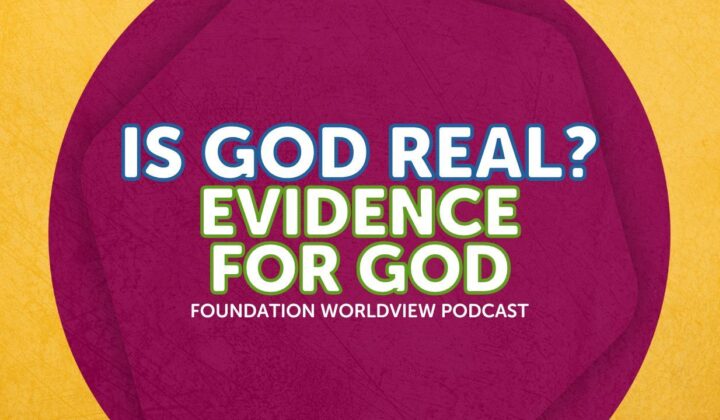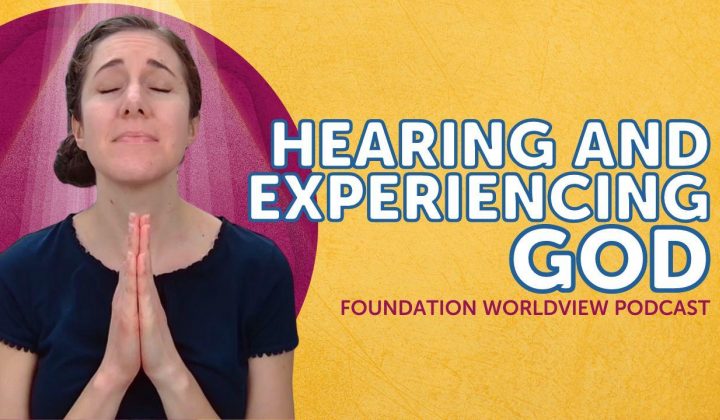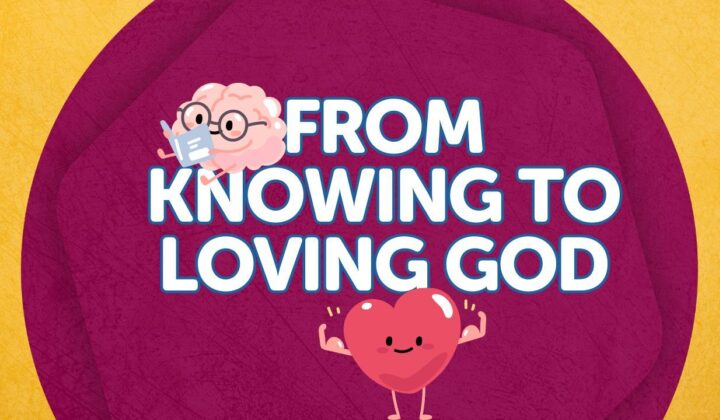Learn more about the journey that led to us equipping kids to carefully evaluate every idea they encounter.
Meet members of our team who have contributed to curriculum development.
Hear from real users of the Foundation Curriculum.
Learn what we believe about God, Jesus, Scripture, and more.
Why Can I Not See God, Jesus, or the Holy Spirit?
In today's episode, Elizabeth shares how parents can help answer their child's question, "Why can't we see God, Jesus, and the Holy Spirit?" Listen to learn how to respond to this profound question to help our kids grow in their understanding of God.
Transcript
Note: The following is an auto-transcript of the podcast recording.
Hello friends, and welcome to another episode of the Foundation Worldview Podcast where we seek to answer your questions so that you can equip the children that God has placed in your care to carefully evaluate every idea they encounter and understand the truth of the biblical worldview. I'm your host, Elizabeth Urbanowicz, and I'm thrilled that you've joined me today for another episode. Today's question says, "My youngest son three has been asking why we cannot see God, Jesus and the Holy Spirit. How can we explain this deep question to our young kids in a way that they can understand and grow in?" I love this question because anytime we're thinking through how do we present truths about God to our children, it's something that really gets me excited because I think that there are so many exciting and simple and easy ways to explain such truths to our children.
So for the person who asked this question, thank you for asking it, and the first thing I would recommend that you do is commend your son for asking such a great question. How incredible is it that a three-year-old is thinking this deeply about who God is and how God relates to him? We want to make sure that anytime our children are asking deep questions, even if they're questions of uncertainty and doubt, that we are commending them for asking such questions because these are things that honor God, that our children are thinking critically that they're actually seeking him.
Now, this question, in particular, excited me when it came in because in Foundation Biblical Worldview Curriculum, which is just a basic biblical worldview curriculum for kids ages four on up in the second unit and the third lesson of that unit, we cover this exact concept. And so what we do in that lesson is we cover the truth. God is spirit, because that is why we cannot see the three persons in the triune God because God is spirit. So what I'm going to do in this podcast is I'm just going to walk us through a basic outline of that unit two, lesson three in our Biblical Worldview Curriculum so that I can explain to you how you can help your little ones understand why it is that we cannot see God, but how we can still know that he is real. So the first activity that we do in that curriculum is we have little ones that think of the names of five people that they know.
And so we give them time to think of five people that they know, and they need to list those five people. And then we ask them, have you seen all of those people? And the answer is yes. If they know those people, they have seen them, or even if they haven't seen them in person, they have seen pictures of them. Then we ask them the question, have you seen God? And the obvious answer to that question is no. And then we ask them, why is it? Why is it that we have seen all of these people that we know and we know God yet we haven't seen him? And we take them right to the fourth chapter of John to verse 24, which says, "God is spirit." And so we read that verse with them, God is spirit, and then we explain. Spirit means something that is not physical, something that we cannot see with our eyes, hear with our ears, feel with our hands, taste with our mouths, or smell with our noses.
So something that is spirit means it's not physical. We can't use any of these senses to perceive it, to understand it. And then we cover with little ones. We say, now someone might think if we cannot see or touch something, isn't it just pretend? And so we ask that question and we give the kids a few seconds to think about that, and we say, Hmm, that is a good question. And then we ask them, are there any other things in our life that we cannot see but we know are real? And the example that we give them first is love. And we say, have you ever seen love with your eyes? No. You've seen the effects of love. You might see a person giving another person a hug or someone speaking kindly to another person or someone helping another person out. And that is the effects of love.
But love isn't something that we can see. Love also isn't something that we can hold in our hands. We can't touch love, we can't smell it, we can't taste it, we can't hear it, but we can see the effects of love. Then we talk about, okay, so love is something that we cannot see and we cannot touch. But is love still real? Yes, we know that love is real because we can see the effects of it. And then the next thing that we do is we play a game with them. We play a game where we name real things and some of the real things are things that can be seen. And if the thing that we name is something that can be seen, we have kids take their hands. And if you can't see me right now because you're listening and not watching on YouTube, we have them take their hands and make a circle with their fingers, so with their thumb on the bottom and then their four fingers at the top touching it.
And then we have them take those two circles and put them in front of their eyes like binoculars, and we have them say, see, every time they put their fingers like that. And then if the thing that we name is something that is real that they cannot see, we have them take their hands and put them as a cover over their eyes and then say, cannot see. And so then we give them a whole list of things. So some examples are we say water, and then when we say water, they should take their hands like binoculars in front of their faces and say, see, because water is something that we can see. We give them other examples like kittens. Again, their fingers should go up in front of their eyes because that's something real that they can see. Then we give examples of things like truth.
We say truth is something that we cannot see. It's something we cannot hold with our hands and touch, but we see the effects of people telling the truth. We also give other examples of things like fairness. We can't hold fairness in our hands. We can't observe it and see it, but we see the effects of people treating one another with fairness. We also give the example of kindness. Again, kindness is not something we can hold in our hands. We can see people demonstrating acts of kindness, but we cannot see kindness itself. These things like truth and fairness and kindness and love and goodness, these are things, they're intangibles. They're not physical things. We can't actually hold them in our hands, but we still know that they are real because when someone treats another person with kindness, we see that kindness is real. So in this game, we're just trying to help kids think of the difference between real things that they can see and real things that they cannot see.
So then we draw the analogy. We make the connection to God that just as we know that these things like love and truth and fairness and goodness are real, even though we can't see them with our eyes or hold them with our hands, it is the same with God, that God is someone we cannot see with our eyes or hold in our hands because God is spirit. But we still see the effects of God all around. We talk about creation, that God is the one who has created and sustained all that. Every time we watch the sunrise or the sunset, whenever we're walking on the ground, and we feel our feet on the ground, knowing that gravity is keeping us there, those are things that are meant to point us to God because those are things that God designed. And then we close that lesson by playing a game where we have them.
We give them two minutes and we say, okay, you need to look around the room and name three things that you can see with your eyes and one thing you cannot see, but you still know is real, so that they're just getting in the habit of consistently looking for, okay, what are physical things that I know are real? And then what are spiritual or metaphysical things that I cannot see, but I know are real? And then after that lesson is done, we have follow-up. We have a coloring sheet, an activity sheet. We have games and a song that can be sung to help kids understand this truth, that just because we cannot see something, just because something is not physical, does not mean that it doesn't exist. That there are many spiritual or metaphysical things that we cannot see, hear, taste, smell, or touch, but we know are real.
It is the same with God, who is spirit. So we can't see, hear, taste, smell, or touch him, but all around us, we see the effects of his reality.
Now, if you just really liked how I walked you through that and thought, wow, that was really helpful, highly, highly recommend that you check out our Biblical Worldview Curriculum because we cover this and so many other important truths that are foundational for grounding our children in an understanding of the biblical worldview. And now, sometimes I know people are hesitant to actually purchase and use a curriculum because curriculum can sound really intimidating. But here is the thing, if we just relegate these big truths to organic conversations that we have with our children, it's going to be hit or miss. Sometimes these conversations are going to come up and we're going to do them well.
Sometimes, these conversations might never come up that we at Foundation Worldview have actually had well-known apologists who have used these materials with their children and said, wow, we didn't realize that we had such gaps in our training of our children. So highly recommend that you check out this Biblical Worldview Curriculum. It lays the foundation in so many important areas to help our little ones understand the truth about reality.
Well, that's a wrap for this episode. But as always, my prayer for you as we leave this time together is that no matter the situation in which you and the children, God is placed in your care, find yourselves that you would trust that God is working all things together for your good. By using all things to conform you more into the image of His Son. I'll see you next time.
Related Posts and insights

Is God Real? Evidence for God
In this episode of the Foundation Worldview podcast, we tackle a question that many parents face: how do we help our children believe in the existence of God? Join host Elizabeth Urbanowicz as she provides practical advice and resources for equipping your kids with rational reasons for belief in God.

My Kid Doesn't Hear or Experience God
Is your child struggling because no matter how much they believe, they are having a hard time hearing or experiencing God? In this episode, Elizabeth Urbanowicz explores how to guide children in their expectations for experiences with God and looks to the Bible and how God speaks to us.

How to Guide Your Child from Knowing to Loving God
Today's question says, "My kids have an excellent book knowledge of God, but how do I move them to a love for God when I ask them if they feel like God loves them, they say they are neutral."





